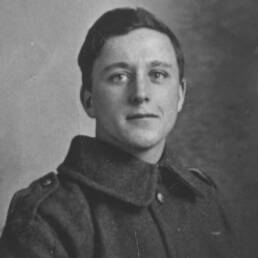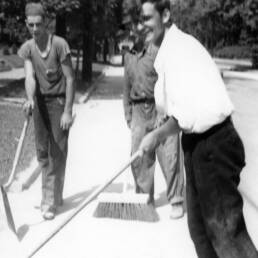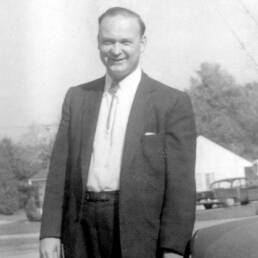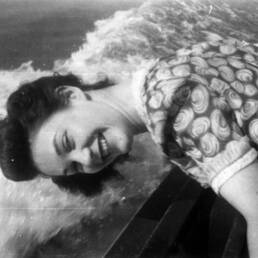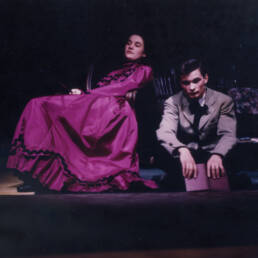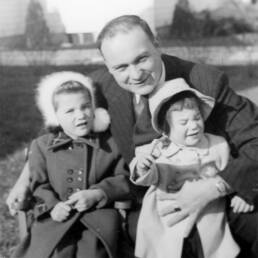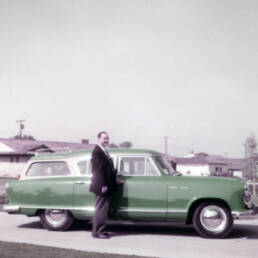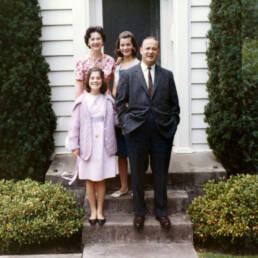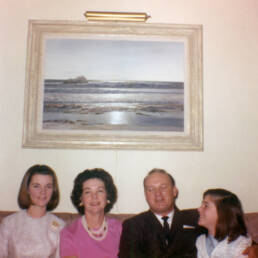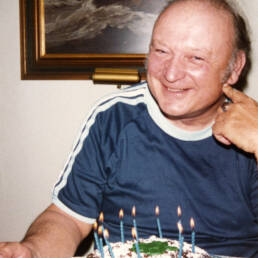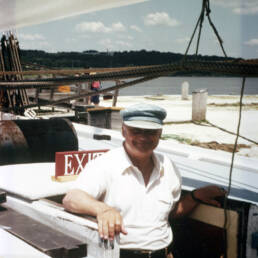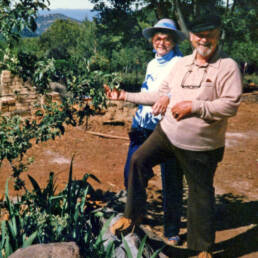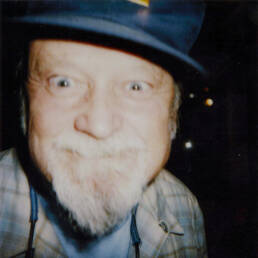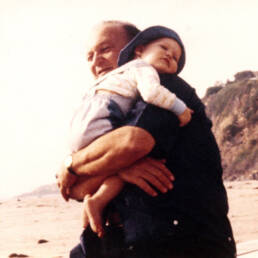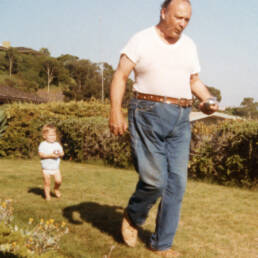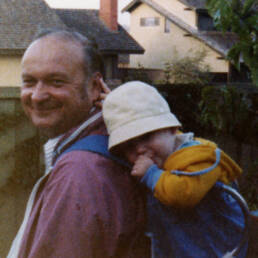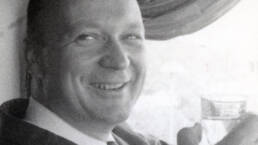
When I was a junior in high school, my AP U.S. History teacher Ron Buchheim assigned our class to interview a family relative about their life and times, to roughly demonstrate primary-source history.
I spoke to my grandfather Tom Denton (1921-2000) on June 9, 1994 about his father, the Rev. Bill Denton (1895-1982), his own youth in Cleveland and Akron, Ohio; and his and my grandmother’s time in New York, the Midwest, and California.
I recorded this interview on a battered cassette-playing boombox, so the audio quality is poor by 2019 standards, but this transcript is as complete as possible. I’m posting it for my mother Miriam’s birthday.
—Keir DuBois, 4/15/19

From Cornwall to Cleveland
KEIR: You can talk all you want because I’ve got 90 minutes.
TOM: 90 minutes?!
KEIR: Well, we don’t need to fill it up all the way. How about we start with when your father came to the U.S.?
TOM: Well that’s interesting, because I was just thinking that last night. I couldn’t get to sleep and I was trying to figure out and remember when he came, but I think he came from Cornwall at around age 14. He was 26 when I was born, and I was born in 1921, so 1895 would have been his birthday. But he came here when he was 14, landed in New York, worked on a big estate on Long Island, and he eventually came west to Akron, Ohio. There were some Cornishmen that he knew there, war buddies—well no, I’m ahead of myself, too far ahead. When he came at 14 he must’ve stayed about a year or two on Long Island.
Then he went west to Akron and he had no money, and one day he was walking in the nice section of Akron called Portage Path, in the west end. He saw this big heavy-set man trying to work and fix what looked like a brand new Cadillac, and the old man [Tom usually referred to his father as “the old man” or “the old boy”] went over and said, “What’s the matter, Mister?” And the man kind of fumbled around and cursed a bit—he wasn’t probably too sober—and said “Aw, this damn new machine’s not working.” And my father said “I can fix that.” He’d never even saw a Cadillac.
So he bluffed his way through that, and they took a liking to him and he found the really, I think first mother he had in a sense, because your great-great-grandmother wasn’t a woman, I take it, that would cater to her boys—but Grandma Howse, his adoptive grandmother in Ohio, thought he was such a lovely looking boy, and at first they let him sleep in the barn. And this was an old fashioned Victorian home with a garden, big lot. It was still in the city, but it had a coach house that had been turned into a garage and garden house. So the old boy, my father, your great-grandfather slept there and eventually they took him in the house and he started working in the rubber factories.
Then when the war broke out, and this is why we can tell a bit of his age, how young he would have been because—I’d have to check this, but I think it was in 1914 he went back immediately to Britain and enlisted in the British army. He fought, and was wounded at Ypres. He was twice wounded by shrapnel, and tore out a part of his chin with the flesh off—big scar, and some of the bone—and he was wounded with a bullet over his heart, and he was not supposed to live for another few weeks. But he died at 87 or so.
What else do you want to know?
KEIR: Oh—well how did he become a minister?
TOM: Well, you probably saw a lot of the D-Day anniversary stuff.
KEIR: Yeah.
TOM: Well in the early twenties, World War I was very fresh, in some ways much fresher than World War II was to those veterans. And the old boy had a penchant—he liked working with young kids. In fact, he wasn’t much more than a young kid himself. So to connect this, he came back to the States after his wounds, and sent for my mother who was 19 and they were married in 1920 in the States.
I was born in ‘21. And the old boy was still very active. He was quite young because he was 26 when I was born, but he wasn’t religious. He had a lot of fun. He drank a lot and buddied around with his Cornish war buddies in Akron. And then when I was three, they had a big brass bed. I don’t know how it happened—I don’t remember—but I was supposed to have fallen against the post of the brass bed and developed a big problem with my left kidney. And in those days they didn’t know much about handling internal organs in the sense of using medicines or that sort of thing. There was a pioneer doctor who became very famous, Doctor Crile in Cleveland. Today, that’s a big Crile Clinic, and he was the only one to have known, or were one of the few to have known how to remove organs.
KEIR: In Akron?
TOM: In Cleveland. And old Doc Meek, a family doctor who was a general practitioner, and became a family physician for well on into 20 years beyond this time we’re talking about, sent your great-grandfather with me up to Crile Clinic and Crile decided he would operate. But the risks were very great, so this made the old boy, your great-grandfather, very apprehensive and his story goes that he prayed then that he’d change his ways, become a Christian, if I would live (though I didn’t make the bargain with him) and as a result I grew healthy and better. He joined a little church just down from the real old farm house that we lived in at this time.
He was unemployed. He had gotten into a scrap in one of the rubber shops with a German foreman and they blackballed him. Incidentally, you should read this book Bob Denton [Bob is my grandfather’s younger half-brother] sent out in which the authors tell of his activities, subsequent activities. It alludes to a couple of times in some detail, but he then became very active in the church and he started working with the young people in the church and he was very good at it. And I can remember as a kid beginning at four or five listening to him tell war stories to this group at weenie roasts out in Portage Lakes, which are the small chain of lakes outside of Akron, late—not late at night, it was late for me—and he’d had those kids just in the palm of his hand. They were enthralled with these tales of cannonade and horror.
And he started that and then eventually he became more involved in the religious interests and started reading the Bible and not working. He would go into this old barn that we lived in, this is a little out of the time era, and he’d take a text and then he preached like the preachers that he’d heard, all to himself in the barn.
And unlike Demosthenes, he didn’t need to put a pebble in his mouth to make himself heard or understood. He had a voice very similar to mine, and my brother’s, Ken, and he learned how to use it. So he went down to a little mission in industrial areas of Akron across from the rubber works. and he started working with them and eventually he decided he wanted a mission of his own. In those days, the slums were very bad in that area.
It was an industrial town and all the brothels would be down there and the bootleggers were there and the gambling places. The old man found a little, small, what would have been a bar and a restaurant that the local gangs used to use. But since they’d prospered, they moved out. And then he didn’t know its background at that time, but he opened his mission there and in those days, the missions weren’t too well thought of—particularly by the big churches—and we were getting into a desperate depression.
But he started preaching down there by putting a public address system up over the mission and getting the railroad to permit them to use the cinder loading area across the street. And as soon as he started getting a little publicity, which came very fast, all of the mountain folk who had come up to work in the shops and who were old fundamentalists, fire and brimstone, began coming down and parking their jalopies and cars and listening to him over the PA. And he’d draw big crowds down there.
Well, the local inhabitants weren’t too happy, not that there were many because this was a really cruddy area, and in particular the local gang members were not happy, and they put out a contract on him. And one day a fellow came and listened to him—and he wouldn’t stop just preaching there. He had a bus that he had converted with a platform that came down in the back and he’d go all through the area preaching in front of the brothels and the other joints. And one guy came down one day and pull a big gun out and stuck it at him while he was preaching. And the old boy looked down at him and said something to the effect of, “I know where I’m going when you pull that trigger, but I wonder if you know where you’re going.”
And that kind of cowed the guy, and a little later on he found out that this contract had been put out by the gang. They were afraid that he was Internal Revenue, was down there to find out what was going on. And there were many instances like that, but he became famous because he’d be right down in that crime area. And I remember one night he was late coming out and he heard a squabble between the mission and what we used to call the charity house because his title or not, he fed these people as well. He asked for food donations and then no matter who you were you’d lined up to get them, no questions asked.
We heard a squabble out between the charity house and the mission, went out and there was a fight and he saw this one guy go like this [mimes slashing with a knife], and he just opened up the belly of the fellow he was fighting. And he saw the old man, the old man hollered, and the assailant ran, so the old boy went over. And then there was the victim’s entrails all lying out there. The guy was holding his hand to his stomach, holding his entrails in and bleeding to death and quickly.
So the old boy picked him up, put him in a widened—the Gospel Car, they call it—and ran at breakneck speed (and he always drove it at breakneck speed). They’ve got a cartoon I’d love to have that they ran in the paper showing him coming off the hill, and he was a very short man and he could barely see. You couldn’t see him practically over the windshield— the people —he was coming down the hill, going like hell, people were jumping out of the way and in the front of the van, said, “Prepare to Meet Thy God.”
So put him on the van of the Gospel Car, got him across, which was very fortunate. There was a bridge that went over the Cuyahoga Valley. This area, by the way, used to be called the Western Reserve. It was part of the first settlements from New England, beautiful hills and valleys, which by this time were desecrated because of the industry, but there were still some of them left. Now they’ve restored them, and they’re beautiful. The old boy rushed him over, they got him in the emergency room and they saved the guy’s life. He was all bent over and eventually came over, came out of it. And he had a hundred stories like that.
KEIR: What was the one about the electric chair, that he used—the smoking…?
TOM: Yeah! As his fame grew in the area as a radio minister, more and more people were interested in what he was doing and saying—including the papers because he sold papers for the papers. He made stories for ’em. The old boy picked up a number of—as a spiritual advisor he’d go into the jails and he started going into the penitentiaries. The big one in Columbus, the Ohio Pen, and he took I guess it was around eight to a dozen men over a period of a few years to the electric chair as their spiritual advisor. And it appalled him to see someone fry. Not necessarily as punishment because they were gone, but he thought it was a barbarous way to take lives, no matter what they did. Thought it was revenge rather than deterrence. So he concocted this big replica of the electric chair. By this time, he was preaching to several thousand people a week, not counting the, uh, radio broadcasts that went all throughout the lesson, particularly to the east.
And he had this hokey setup in the middle of—he’s preaching about the value of life value, life after death, what happens to bad boys and all that sort of stuff. Basically his experience with these fellows and how badly they died, and he started out—first he put me in the chair! But I was too young for that at that point. And then finally he found miserable looking characters from the congregation, and as he comes to the climax of his sermon, and this guy would be sitting there go through the routine, like [mimes a drumroll], and they put the mask on over his face and he’d be tied down on the chair at the arms. And he had a couple of electrodes that went down and he had—he was good at finding men to do this sorta thing! He had a big electrical deal that they can go throw the switch and it would buzz all over and they would go like this [mimes shaking/seizing], you know, quite startling.
And they came, jeez, it was just like a circus, but he had quite an attractive attitude among people in reference to the chair. He thought, frequently, that, it was unjustifiable, because of the nature of the death, that was unjustifiable. Because if the, if you were broke and everybody, most of his people were broke. There was no opportunity. There were no public defenders as such. And even with them, they wouldn’t be the best of counsel. You had a lot of money, you could get out of it. But that’s how the chair act developed.

Akron in the Depression
KEIR: What was school like? High school.
TOM: High school? High school was a lot of fun. There were some very dedicated teachers in those days, as they are today I’m sure. I don’t know whether they demanded more out of us than they do out of you guys these days, but the schools were better sized from a class standpoint. Many of them were very old. I went to one of the oldest and it drew from not only this slum area and abroad area on the slums, but the middle class, blue collar worker and the laboring men in the factories. It was the original old downtown area. It was situated in the original downtown area and we could walk six or seven blocks or maybe it was really more than maybe three quarters of a mile right into town itself.
I don’t think there was the emphasis then for college preparation as there is today. Very few went from high school to college. Even when I went starting in ‘35, because there was no money and frequently because no one had a college education before them in the family. Mostly people were living many—you know, big family, maybe two families, in a house it’s just to have money and odd jobs. It was tough times in the ‘30s and it didn’t improve until the war came along.
But I think maybe we had a more convivial experience. We had high wide clubs. Those were all kind of clubs just like you guys have your fun. We had, I think we had more funding you guys have today. There was a smaller group, a tight-knit group, and if you wanted to accomplish anything outside of a school record, we’d have to take on some of these clubs and get to know them. One of the best clubs was High Wide and we used to meet at the YMCA. We had a teacher who was a proctor although that’s not what you called them then. But he was the shop man. He loved kids. We’d meet early morning in his shop and he would interest you in whatever you might be interested in; you didn’t have to be taking shop. But he also worked in a lot of moral advice and encourage dkids to do better work. I remember going to High Wide.
You know, there were tough times. Even then you’re safer in a way in the streets, but not always, depended on who you were. We used to have High Wide meetings on a Tuesday night and my friend Bunny, who was a little small guy, never grew very high but his ears grew like this. We were off to the YMCA, which is quite a hike. We did a lot of walking, walked all over and we were walking through the slums on our way over one on the poorer streets. And as we crossed, as we came to one crossing, there were three big burly guys drunk—and man they were loaded—and they were harassing this tall black kid.
We didn’t see how it started but they were shaking him and we stood around watching, and apparently they didn’t like that, so they stopped and started walking off. But then one guy came back and got hold of the kid again and we were standing at the edge of the—they were in the middle of this brick road off of Hollard Street, and as this fellow berated him—the drunk was—he had his back toward the hill on the street, and this kid hauled off and just caught him flush on the chin and he went down like a—he just fell right over like a log going down, and his skull. You could hear his skull go crack on the brick.
By this time, the other guys were running after him. They were, they had been just not too far down. boy that kid came by us. It was like a black streak. They never caught him and we didn’t hang around to see what was happening because we didn’t want to be implicated, but when we were on our way to the Y that night, we probably had some nonsensical little program to go through. But that sticks in my mind like mad. We were doing that sorta thing, we were in kinds of clubs, which was fun. The teachers for the most part, were fine, really fine. They came from good educational schools in the Midwest.
Ohio hit a lot of small schools or small colleges and for the most part the people in that state, as in the east, generally going to the small schools, are given a lot of personal attention. I can’t remember—maybe one teacher was of an exasperating nature, but that probably was because I stimulated it. In fact it is. She used to carry this damn ruler around.
KEIR: So it was kind of like a small town atmosphere?
TOM: Well we thought it was a big town, but with 200,000 people in it, it really wasn’t a big city compared to New York, Chicago, Detroit, Philadelphia, San Francisco. I think the population was about 220, 240 thousand, with many more on the outskirts. It was a very important city and the environs were important because it was part of the industrial belt, and most of the tires built for American machines were built right within that area.
KEIR: So it was a big deal when the war came.
TOM: Oh yeah. What used to happen— and someday you’ll probably study the labor movement—during these times, these were good paying jobs with or without the union. For peacetimes it was considered good. Working conditions weren’t necessarily good. So that during peacetimes when things were booming, like in the ‘20s, the poor whites from the Appalachian area would come flocking into town and live in all kinds of dumps, but they were making, when Ford started they were making $5 a day in certain periods. Then the wars would come along like World War I, and labor was tight.
So the blacks would come in and the blacks would find jobs at more money than they could ever find elsewhere, but then peace would come and the blacks and the non-local Ok—they were called Okies or Arkies or “mountain boys” were called up. There wasn’t enough jobs to do, so local people would be called up. The factories would keep quite good records in that regard to prior employment and they ran a tight association, they could blackball a man just like that, like they did your great-grandpa, and many others for many reasons.
But anyway you had the High Wide clubs, the YMCA. In the winter you’d skate or you’d go sledding and you go with families or you’d go with buddies, there were always plenty of areas that you could operate in. Spring was the worst time. It was a miserable time. That’s why the Y was necessary too, because of the wet cold, not very pretty. The area would be, it was always dirty because of the rubber factories. It wasn’t until very much later that they cleaned that up.
KEIR: The Cuyahoga was just supposed to be one of the dirtiest places.
TOM: Yeah, the Cuyahoga for instance at one point caught on fire, literally.
KEIR: Yeah, I read that in a National Geographic I think.
TOM: I had a dear old friend, a friend of your grandmother’s and mine—she had known him from kindergarten up, I guess he had gone to the same church. They did their catechism together. He was a wonderful guy. Unfortunately, he had a chemical imbalance that would send him off on one hell of a trip. He’d be walking around the streets wrapped up as Jesus Christ in a sheet. They used to give him shock treatments, but he was a very, very bright man.
He ended up as a lexicographer, he was responsible for much of the editorial work in that great big dictionary that we have on the divider. After he’d go through one of these terrible bouts, he had to settle down somewhere on something that didn’t disturb him too much. So he took a job as a gate tender for the railroad, over the Cuyahoga River. Isolated area. Cleveland was only 35 miles from us, so we had a big city close by.
Of course that was a big trip too, you know in our eyes, until we were teenagers—and he would see the cesspool going down that river all the time. Refinery dumps, chemical dumps, everything, when there was no attempt to maintain or conserve the environment. What the industry wanted to do, they did, because they made it possible for everyone to have a living—not everyone, but people in those communities—to have a living. They had the political clout. The unions kind of evened that up a little bit, but not so much with regards to the environment. But particularly during the early New Deal, with reference to working conditions, health conditions. But the kids generally I would say had a lot of fun, a lot of fun. That is those that I knew.
KEIR: What did people there think of the big names at the time, Roosevelt for example?
TOM: Well, some of them thought only with reference to what the newspapers would have to say. Newspapers in Akron were split. The Beacon Journal—Knight Ridder, it’s now known as, generally supported the community political interests of the well to do and the establishment. The Times-Press didn’t go that far, but would cater more toward the working class tastes and type of stories they reported to establish their market.
MIRIAM [my mother, arriving home]: Hi!
TOM: Hi honey. [To Lis, my sister] Hi baby. [To me] But the division was pretty heavily split. Professionals, a very small clique indeed. And they wrangled with the elite or the factory management. Roosevelt basically was considered very highly in our industrial area, or what’s now the Rust Belt. Your grandfather didn’t care for him at all. Your great grandfather is—
KEIR: Because he [FDR] was a more of a lefty.
TOM: Yeah, he was. Your great grandfather was a red-baiter, because the communists were atheists and in those days, and in particular this, was always a big political division. Not everybody believed that way, but the Republicans played it up in those days. Roosevelt made it possible for so many things. He made it possible for a living wage. He made it possible—assisted in making it possible—for some security for old age when there was none. Not completely, by any means, but best of all I think he delineated the problems that plagued people then. With the economy gone awry he gave them hope. But then you’d see the farmers in southern Ohio, in all of Ohio, you’d see them mostly conservative and Republican in southern Ohio in particular.
KEIR: And it’s still like that?
TOM: Basically, basically although the cities have lost population.
KEIR: I’ve always noticed it’s been a real contested state, in every election—if you get Ohio you win.
TOM: Ohio, Pennsylvania, New York, Illinois, north and south. Always divided. Part of that is historically too, still a result of the Civil War. particularly the border states: Ohio and southern Indiana might just as well have been part of the Confederate States. They weren’t, but the attitude was in that area, and still is to some degree I understand. You ever read Anderson’s Winesburg, Ohio?
KEIR: No.
TOM: Go stick your nose into that one sometime. I go through there whenever I drive back from Detroit, pretty country.

From Cleveland to Cuba
KEIR: I told Mr Buchheim about this a little, I just hinted at it—the trip to Cuba and lunch with Batista.
TOM: [Laughs] Batista’s major, not Batista. He was Batista’s “business manager.”
KEIR: Oh yeah. Okay.
TOM: Well, the old boy found that he needed rest occasionally, the old boy being your great grandfather. And I can remember we started going down—he had to find churches to preach at. When we started going down to Florida, this would be when I was probably 13, 14, in ‘33 and ‘34, we’d go out of these bad winters and go down to Clearwater, Florida. And my father began to build a network down there. He wanted to do church work and he wanted to expand just by way of radio, but the churches had a pretty good union down there. Southern religion is pretty hot and heavy and very stringent.
So he would never—he was never able to get a spot on any of the radio stations, they were always filled. So he said the equivalent of “to hell with this,” whatever his equivalent might have been. And he went over to Havana. At that time Batista had complete control on behalf of American Sugar and a few other corporations, and he ran it with an iron hand and he had everything—including this powerful radio station that would cover all of the southeastern area, of Florida and Georgia and into even Alabama.
And they were very happy to give this personable minister—who drove such a beautiful blue convertible Chrysler—time. And he started building quite a network down there, radio network. Which he’d take care of rather awkwardly from Ohio when he was back in Ohio, but with exuberance, and during the winter weather period. And let’s see, I was in, I was a sophomore and the war, was it was a year before the war. The draft had started and there was excitement on the campus and unrest. You weren’t thinking too much about what you shouldn’t be doing with your studies. You were wondering what the hell was going to happen.
So he was down there and I thought “by God I’m gonna take a couple of weeks, see what’s going on down there.” So I wired him saying I was coming down and apparently he wired back—which I was never quite aware of—”don’t come.” And I took a bus down to Key West and then a ship from Key West to Havana, and we got in just as the sun was setting. And I can still see that gorgeous scene with the sun, on all those multicolored Spanish buildings and the fort that extended out.
KEIR: Into the water?
TOM: Oh yeah. But to make a long story short, I got down and he, he was there because I told him I was on my way. And he was happy to see me. He would often get homesick. And he had a nice apartment in a spot not too far from the radio station, and for a couple of days we got along pretty good and he introduced me around the station. And those Cuban dancers, they were wild, they were absolutely wild.
And after maybe two or three days, he had me meet with the major, whom he was taking out to this restaurant, and the major came with two attachés. We go down to this fancy restaurant, walking through this long trellised area, like a grape arbor or grapevine. Instead of the grapes it was gardenias. And I had never smelled gardenias so strong in my life. But that was my encounter with Batista’s major. He was a dour son of a gun, but he liked the old man.
And that was also when I walked in, with my camera, into the University of Havana Medical School and started shooting pictures of an operation going on. Now, there was a Life—I didn’t know this—there was a Life photographer who was scheduled to come, and I was mistaken for him. And God they treated us royally! I took several pictures, of a leg that was opened up on the operating table. It was fun! So your great-grandfather held onto that gig for practically up until the war started.
KEIR: And then he had to go back?
TOM: Yeah.

Back to Broadway
KEIR: And then you lived in New York for what, like a year?
TOM: Yeah, your grandma and I. That would have been after I failed the physical in the Air Corps.
KEIR: Oh, cause of the kidney.
TOM: Yeah. I passed everything else with flying colors. And I had a license from a civilian pilot training program in college, so I thought I’d be a shoo-in. So when they cut that out, I was pretty disconsolate, and here we were stuck in Akron and all of our friends, our buddies from college were in the army, the air corps, the navy. And our particular little group, it was all depleted.
So I thought to hell with it. I don’t know what I’ll do, but I think I’ll leave your grandma for a week or two and see if I can get myself a job on Broadway. Well, there weren’t any jobs on Broadway and I was too green to find out to know how and if there were, and I stayed with some friends, that had befriended your great grandfather when he first came over, in a little place called Tarrytown outside of New York, about 40 miles or so up the Hudson River.
So then I became quite excited about the possibilities in New York because there were all kinds of jobs you could take. And for us in New York was where we always as college kids, we always looked at it as the Big Apple—the big city, they didn’t call it the Big Apple then though. And uh, I came back and I I told Ev [his wife, my grandmother Evelyn Denton] let’s leave these factories and stuff and go get some office jobs, and maybe we’ll start school down there and work. And that’s what we did. We found an apartment, Broadway and 79th. And your grandma worked as a clerk, keeping a record of the ships from an American shipping company that were being sunk by the Germans as they came out of Cuba, right off the coast of Florida. Some of the hulks would make it back, some of them wouldn’t.
And I got a job with an outfit called Solar, that were experimenting with little wax-built condensers that would go into airplanes. They’d build ‘em in New Jersey and ship them west to all the big aircraft factories out here, and Grumman up in Connecticut. And we had not been married very long, so this was Magic City for us. And we’d go through a routine of going down to McGinney’s for beer and shrimp and then from what we were making, we’d see a play every weekend,
KEIR: How much money?
TOM: Not much!
KEIR: For the total cost of everything?
TOM: We were paying about $75 I think, which was a lot of money, for the flat. It wasn’t much bigger than this room. And maybe the alcove. But it was just off was a block, two blocks, a half a block off Broadway, two blocks off of the Hudson, and four blocks off Central Park with a subway stop right there.
KEIR: So you had it made!
TOM: We did. We had theaters that we could get to, we had pocket money (but we weren’t able to save anything) and we made some friends. And then eventually I started thinking, well this was very nice, but I gotta get into this conflict somehow. So I tried to get into the merchant marine. Your grandma wasn’t very happy about that. But neither was the merchant marine very happy with me!
So what happened is that I started law school, at NYU, and for some reason or other I had to have a physical, I didn’t know whether it was for the job that I was getting; I was pretty unhappy with the solar. They had taken me out of the office and sent me over to do cost accounting, in a real run down New Jersey place. And I’d be gone for hours in a day because I’d have to commute back and forth, and commuting on the ferry to that particular spot was no fun. So we weren’t seeing too much of each other. When I’d get back, I’d have to hustle down to NYU right away. So I applied for a job, I think another job, and I took a physical and this doctor said “you got a bad heart problem.”
And I said “Not really. It was something that was born with, a murmur.” And he said no. He says, “Where are you from?” “Akron.” “I think you better get back to your family doc and have this checked out.” Well about that time, your grandma was apprehensive. We had lots of New York, New York, and for quite a bit. So we decided to go back and I’d go back to college, finish my degree, and there was no problem getting a job and going to school at the same time. That’s what we did.
KEIR: In Ann Arbor?
TOM: No, in Akron. This was not the law school. In those days, depending on the school, if you had two years of general college, some law schools would permit you to enter, which is what NYU did. But I’d had two years, but I hadn’t finished my degree. And so we went back to Akron and I picked up the reins from there. And we stayed with your great grandmother for a brief time until we found an apartment right across from the campus. And I got a job in a cigar joint that paid very well for the amount of hours, and Ev went back to the Goodrich job, about which she knew a good deal, in synthetic rubber. So it was a combination of school, with old friends, some of whom had remained, and I finished the degree up in the summer of ‘45 and started law school in Ann Arbor.

Go West
KEIR: What made you want to choose your job for the book company?
TOM: For West?
KEIR: Yeah.
TOM: Ev had become kind of—well she was never really healthy all the time. And I was in my second year of law, and she was having a bad time. She went to her doctor in Michigan and in effect he said “you’ve gotta get into some drier weather.” So we took another journey. We took off from law school, we started out west, and our first stop was Tucson.
But before we did that, I did decide how to make some money too. And I went to one of my law profs and he said, “well, you’re no damn good to a law office yet if you’re going to have to make money. What you might do is considered going the legal publishing company. You’ve come this far and it would be great stopgap. Yeah, make your money, then come on back.” So I thought about it a bit and picked up a couple of letters of recommendation from the prof, from some folks in Akron and sent the application back to West. God, they answered right away. I went out with —and had a call from the representative in Detroit and he came up to —he had me come in to, in to his place in Detroit, on the outskirts of Detroit.
We had this interview in this restaurant, as he had me come to Dearborn, and we went to a restaurant and he told me something about the company. Very old. I knew some of their law books from studying for some of my coursework. And he said they were short a man because this was still, let’s see, this would have been ‘47 and not all of their me came back to them. And they had an opening in Michigan—no, in Ohio. And I thought, ok.
So then he says “how much would you have to have?” And I’d been told to think of what you want and then double it. And we weren’t making that much during the war; maybe about $75 to $100, give or take on a monthly basis, and during wartime all wages were frozen. So I said “Well, I would need a bare minimum of $350 and all expenses.” And he just looked at me and said “Mr. Denton, nobody has ever come into a company and been paid that much,” and I said, “Well that’s what we’ll take.” And he said “I’m not sanguine about your prospects. We would like to have you, but that’s considerably more than we pay anyone starting out.”
I said “You let me know. In the meantime, I’m taking my wife out west, and mail can be forwarded if you have any.” And we came out here. Stopped at Tucson, met a college chum who was at the University of Arizona and he was running a good deal in his apartment. They were building like mad in Tucson and he hired a couple of Mexican carpenters, and he got hold of some army surplus lathes and woodworking equipment, and set it up in the basement of this apartment that he lived in. Hired these guys to make a cupboards for contractors building these fast moving homes that were going up. We liked Arizona, we liked New Mexico— we’d stopped in New Mexico too.
KEIR: What made you want to come to California?
TOM: Oh I always wanted to come to California. As a boy I was reading a book when my mother was dying, all about the areas from Long Beach down through Orange County, a duck-hunting area, and I thought “gee that’s for me,” and I was always reading western stuff.
But to us California was the future even then. New York was a big attraction, so was Chicago, but for anyone who’d seen the west and the Midwest this was a really wonderful place to come to. We almost did it initially because I was accepted by Michigan law and Stanford, but Stanford, I would have gone to Stanford without knowing how the hell is going to pay for it. I would have gone to Stanford but they wanted me to wait a semester. But I wanted to start right away, I didn’t want to wait because all the guys were beginning to come back form the Forces.
So this friend of ours who was building cabinets, on the second day we were there says “Tom, we’ve got to take a trip into L.A.” Lumber was awfully hard to get. It was very scarce. He said “I’ve just heard there’s a carload of lumber out back of the railroad system down here and we’ve got the location. If we move fast I can get enough good lumber to last me for the next couple of years.” He was overly optimistic.
But we came up by way or the southern route through San Diego to L.A. Of course the lumber had long since been gone. We tarried a little bit in Los Angeles, got a whiff of it and to me, it was wonderful, and then we got back to their place and there was a letter forwarded, saying they wanted me to come to St. Paul for an interview.
KEIR: for West Publishing.
TOM: Yeah, so we scurried back to Akron, and then I took off for Saint Paul. They just considered it a done deal. It’s already the—
KEIR: At the same salary?!
TOM: Yeah! And they took me in, and I had two weeks of really rugged training with an old character, an old lawyer on their law books, and there wasn’t any psychology of selling or anything like that. It was just a legal bibliography, and they sent us back down. We came home just before Christmas and they sent us down to the northern part of Ohio, the whole big Akron and Cleveland and Toledo south through that group of states. What I didn’t realize was that they were sending me the worst damn territory, no, the next to the worst—no the two worst territories it turned out to be. They didn’t have any great publications down there.
KEIR: So you weren’t going to get paid that much. That’s why they hired—
TOM: Yeah. And I wasn’t down there—We took all the stuff out of the flat, put it in a trailer, and moved our miserable stuff done to your grandmother’s. We moved in there on a weekend and on Monday West called and said “Mr. Denton, we are a little embarrassed, but we have a real problem in Michigan. We’ve lost our local man, and do you think you could get your apartment there?” Because housing was really tough to find. “And would you prefer handling Michigan?” And I said “All of Michigan? “No, not Wayne County, another man has Wayne County, all Detroit, but you’ll have all of upstate.” Well it was a step up from Ohio, quite a step, but it wasn’t a prime territory either.
KEIR: What was?
TOM: Oh gee. All the South. California was a not a prime territory, but they only had two men out here. And all the federal stuff, which we were strong with, they could control. In Michigan, there weren’t too many offices outside of Detroit going into federal court, and we had nothing in the way of state publications. And he had an old digest. But we made it work. And that’s how we got with West publishing, and that’s why your mom was born in Saint Joseph’s hospital in Michigan.
KEIR: So working for West took you to a lot of places. I mean, in this country it took you to a lot of places, early on.
TOM: Yeah, early in Ohio—no not Ohio because I didn’t really work there, let’s see, we went back right after Christmas. We went back New Year’s and I started in Michigan and in— that meant only seven months. They had a seven month year.
And that seven month year without any special arrangements. any special assignments we made about, I think we made around $7,000. And that was big money. It was more money than what Michigan attorneys were averaging on an annual basis. So I got complimented and all that sort of stuff. It made me think, what the hell kind of territory is this? If I get complimented for this but guys were coming in with 10, 12, 15,000? It made me look around!
And the following year we came back, worked hard, and then in February I got a call from a sales manager and he says “Tom, we’re putting a new publication in Ohio, and when we do this, you’ll be working with a crew of senior men, and we would like you to go down and work The northeastern part.” Well it wasn’t the best setup, but being that there was no local publication it was wonderful, and I went down there and worked it that year. That’s when I saw how you could make money in a big market. So Ohio went on for too long, really, but we were successful with it.
What West would do would be to take 15 or 16 of us and throw us into a new state with a new publication, and we’d freeze the competition. He had so many men running through the offices with the prime new work that the others weren’t able to get a hearing, and we’d sop up all the purchasing power that there was. And so there followed a number of years like that where I worked in Michigan as a home territory. Within every 9 months to a year, there’s be a campaign, you make your money on the campaign and hold down Michigan.
But when I got to California on the campaign, which is a long, long drag up, in fact—no, the second campaign was Indiana, the 3rd one was California. Goddamn I forget. I think that’s the way it went. It was hard money, and I was separated from your grandma, but that’s the way you made your way. And it got so that the excitement of it and the quality products that we handled sustained and maintained you with what you were doing.
Sometimes I regret it. Sometimes I got to know what law practice was like from the inside without having to participate in it. I would’ve liked some of the combative elements of the practice, and the fact that you were using your noggin constantly. But there were some aspects I didn’t like.
KEIR: Like what?
TOM: A lawyer’s time, like a doctor’s time is really not his own and he thinks “so many of the guys think I’ve got my own business, a real business with a certain respect,” but you’ve always got the judges and commissioners and in the big cities you’ve got some pretty sleazy practitioners.
Nevertheless, it’s a great calling, a great calling. I sometimes wish—I watched today in a courtroom a young lawyer up against a really tough defense. Kid’s gonna get eaten up, and the judge is not happy with the way he’s presenting the case. And I really felt sorry for the guy. I’m having a problem with keeping my, keeping an objective view with reference to his client’s case. And I watched this defense lawyer come up to chew him up and very neatly; I could appreciate the fellows ability, the discipline he’s put in. But I don’t appreciate—well I’m not supposed to talk about that case.
KEIR: Is that off the record?
TOM: Yeah, But basically I was tarnished by making too much money too quickly, but I wouldn’t want to risk doing it otherwise, particularly with the girls growing up. I got to enjoy most of my time at West, and also because I was my own boss in the field, I ran the operation. If they told me to do something that could be handled to the advantage of my customers and the company, I’d do it. If I thought it wasn’t wise or if they wanted to push a particular volume on a mass level, try to make it applicable to every lawyer (because all practices are not alike; there are many variations in the practice almost as there are in the medical profession) then I wouldn’t push the book. If some guy wanted to go over by more than once I would cut him down. So I had my own operation going and I only had to put up with them 10 days or maybe 20 days if I’d call up to the office.
God I haven’t talked like that for a long time. Is that enough?
KEIR: That’s great, yes thank you!

